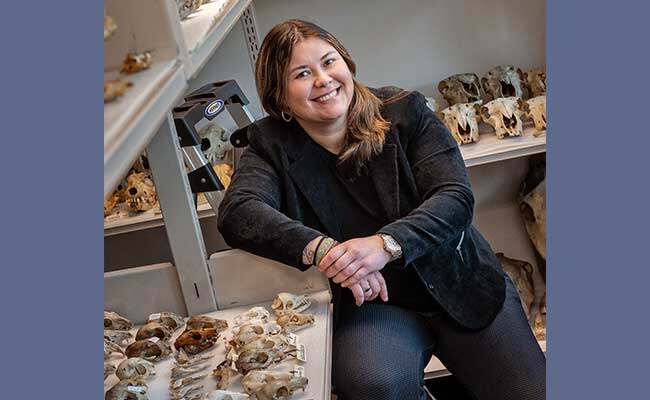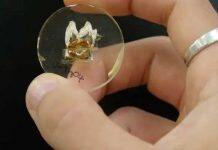Dr Carolina Loch is interested in stories – specifically those which an animal’s teeth can tell about its life. Now she shares her own story, which has taken her from Brazil to Dunedin; from biologist to cutting-edge dental researcher.


Each of us carries our life story in our heads – quite literally. Our teeth hold records of how we have lived, much as a black box carries information
about an aircraft’s flight.
Dr Carolina Loch (deputy director of Dentistry’s Sir John Walsh Research Institute) is a world authority in unlocking the histories of teeth.
“You can get so much information: age, diet, health and disease, lifestyle, exposure to chemicals in the environment – I’m exploring the potential of teeth being a ‘black box’ that can unveil the secrets of a mammal’s life.”
Loch’s research has involved marine mammals and primates, including modern and ancient humans, revealing new truths about our present and our past.
Since her PhD in Oral Biology/ Palaeontology at Otago in 2013 she has published more than 60 papers in international journals, given more than 50 conference presentations, been involved in research grants totalling $1 million, and won numerous accolades, including an Early Career Award for Distinction in Research in 2019.
When Loch won her award, she had ambitions to see Otago and New Zealand becoming world leaders in researching evolutionary oral biology. She’s still confident.
“We have made big steps working towards that. COVID has slowed our progress temporarily, but we’ll get there.”
Loch studied biology and zoology in her home country of Brazil before gaining an Otago scholarship to do a PhD with Geology’s Professor Ewan Fordyce and the late Professor Jules Kieser (Sir John Walsh Research Institute).
“Professor Kieser was one of the most inspiring and influential figures in my academic formation. It was an interesting journey for a biologist to end up in dentistry. I never expected that, but it shows the importance of being open to new ideas. You should take advantage of every opportunity.”
Loch’s PhD on the evolution of teeth in whales and dolphins led to pioneering work that has secured her place as the world expert in the field.
“For most of it we were creating new approaches to the study of dolphin and whale teeth, doing things for the very first time and now everyone is following in our footsteps. That work is still very close to my heart.”
Loch’s wide range of projects includes identifying ocean pollution by tracking metal exposure in marine species; looking at the effects of lack of vitamin D in human teeth – especially in the South Island, which sees less sun; characterising new treatments for dental caries in children; and understanding how baby and adult teeth can hold clues on rhythms of growth in humans.
Recent work with Loch’s Postdoctoral fellow Dr Ian Towle has been examining the evolution of humans and other primates and has found wear on the teeth of Japanese macaques similar to that found on early human teeth.
This unusual wear was considered evidence of tool use, indicating advances in our ancestors’ cultural habits. But the same wear has now been found on macaques that don’t use tools, so our early history may have to be reconsidered.
In 2020 the International Association for Dental Research selected 25 young investigators worldwide for a Centennial Emerging Leaders Award to recognise researchers “who will lead the dental research field into the next century”.
Dentistry’s Loch and Dr May Mei were two of only four winners from the Asia Pacific region.
“This recognition shows we are doing great things here at Otago,” says Loch, who was honoured and humbled by the award.
“The IADR is the most important dental research association in the world, so it was quite an achievement for someone who is not even a dentist to be considered. That was really cool.”
This story was first published in Otago’s annual research highlights magazine He Kitenga. This edition’s theme was emerging researchers.








































